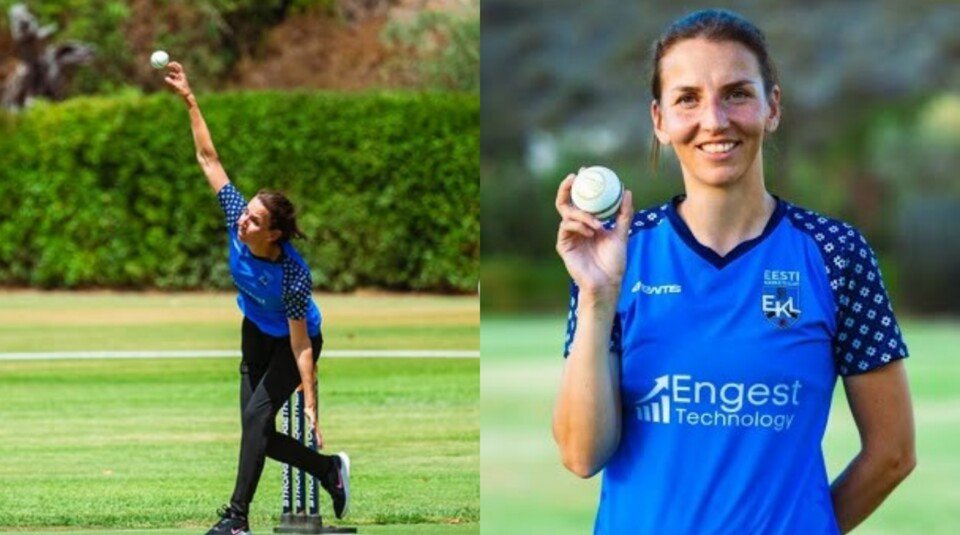By the time Estonia’s women clinched their maiden T20I victory, the moment was already bigger than the scoreboard. For Annemari Vessik, who has been part of the Estonian cricket story since the very beginning, the significance took time to sink in.
“When it happened, I actually wasn’t thinking about it,” she says. “I was happy that we won the game, but as it was the first game of the series and there was a lot of cricket to be played in those four days, my focus and thoughts were already on the next games. So it actually took some time to wrap our heads around what we achieved with the team.”
They had made history. “This first T20I win is written in Estonian cricket history with our names on it, and it is special,” she adds. But for Vessik, it was also a full-circle moment, from the early days of learning cricket in borrowed kits and mixed-gender friendlies, to captaining a national team finally stepping into the international light.
“As long as I’m not too old, I’ll keep playing”
Vessik’s introduction to the sport came in 2009 by chance. “My friend was playing and invited me along. I didn’t have much time to actually watch and learn, but was pretty much invited to play a game when I arrived at the ground,” she recalls. “People playing were super friendly, there were all kinds of nationalities, younger-older all mixed together, and the game itself was interesting and new to many of us on the ground.”
That welcome became a foundation. “I think the journey with all those people (some still playing) is what has kept me part of the Estonian cricket family as well.” A women’s team was formed in 2011–12, competing in a handful of tournaments before fading. Players moved, had children, or lost interest. “For some years we really struggled to get women’s cricket going,” she says. “So all women available were playing with men in men’s leagues.”
The team’s current resurgence began in 2022 under the guidance of operational manager Terry O’Connor, hired by the Estonian Cricket Association. “He really put a lot of work into getting the women’s team together and promoting cricket to get more players and also juniors to play,” Vessik says. “It was not an easy task to promote cricket, which is not so familiar game in a small country like Estonia.”
The group he assembled, many of whom remain central today, has since formed a close-knit core. “I think we have a really good core to keep going and get better. I think I still being part of cricket is kind of natural and I’m not really thinking how long will I play or should I stop. As long as there are opportunities and I’m not too old I’lI keep playing.”
Indoor nets, outdoor dreams
Estonian cricket is shaped by its geography. “Due to weather, most of the year we must train indoors (October–April),” Vessik explains. “Usually we can go outdoors in May and stay until September, but still dependent on the weather, as the weather can easily cancel the sessions.” Training varies between skill-based work, fitness sessions, and game simulations, often in school halls with indoor balls. “The transition to outdoor and heavier balls is always a bit bumpy, but most of the players usually get used to it in a session or two.”
Through the gaps in structure and opportunity, Vessik’s love for the game endured, supported by someone she met through cricket. “I met my partner Marko Vaik in cricket as well,” she says. “He also started playing cricket in 2009, but we got together as a couple in 2012. He is also part of the Men’s National Team, and I think we both keep each other going even in the toughest of times. He is my biggest support,t and he is one of the reasons I keep playing as well.”
Playing in men’s leagues, Vessik found growth through challenge. “I just enjoyed playing whenever I could and I think playing with men has definitely helped me grow to be the cricketer I am today.”
A coach who brings clarity, a team with direction
Since their return to international competition, Estonia’s women’s side has also benefited from the arrival of coach Anuradha Doddaballapur, the former Germany captain. “I think the main thing she has brought to the team is clarity and focus,” says Vessik. “She finds a good balance of her coaching and players’ self-analysis to improve players’ and teams’ skills, and I think it is a perfect way to coach.”
That balance matters especially in a team of semi-professionals and first-timers, who juggle cricket with full-time work or, in Vessik’s case, full-time parenting. “Currently, I am a stay-at-home mom for 2 amazing children – Rasmus and Annabel,” she says. “It is high high-intensity full-time job without breaks, but every heartfelt moment makes up for all the struggles I get. Going outdoors with family as much as possible and also good teamwork with my partner helps a lot to keep things balanced.”
“Growth is something we value and also need”
Estonia’s calendar is a busy one: series against Finland and Switzerland in July, Gibraltar in August, and Czechia in September. Each match is a building block for the future. “I hope to see new women and juniors joining cricket every year, and looking forward to new talents being selected for the National teams. So, in general, growth is something we value and also need.”
For now, though, there’s still magic in the small victories and in watching others fall in love with the sport the way she once did. Her message to the next Estonian girl curious about a bat and ball?
“If it makes you curious, go ahead and try: you might fall in love with it.”

